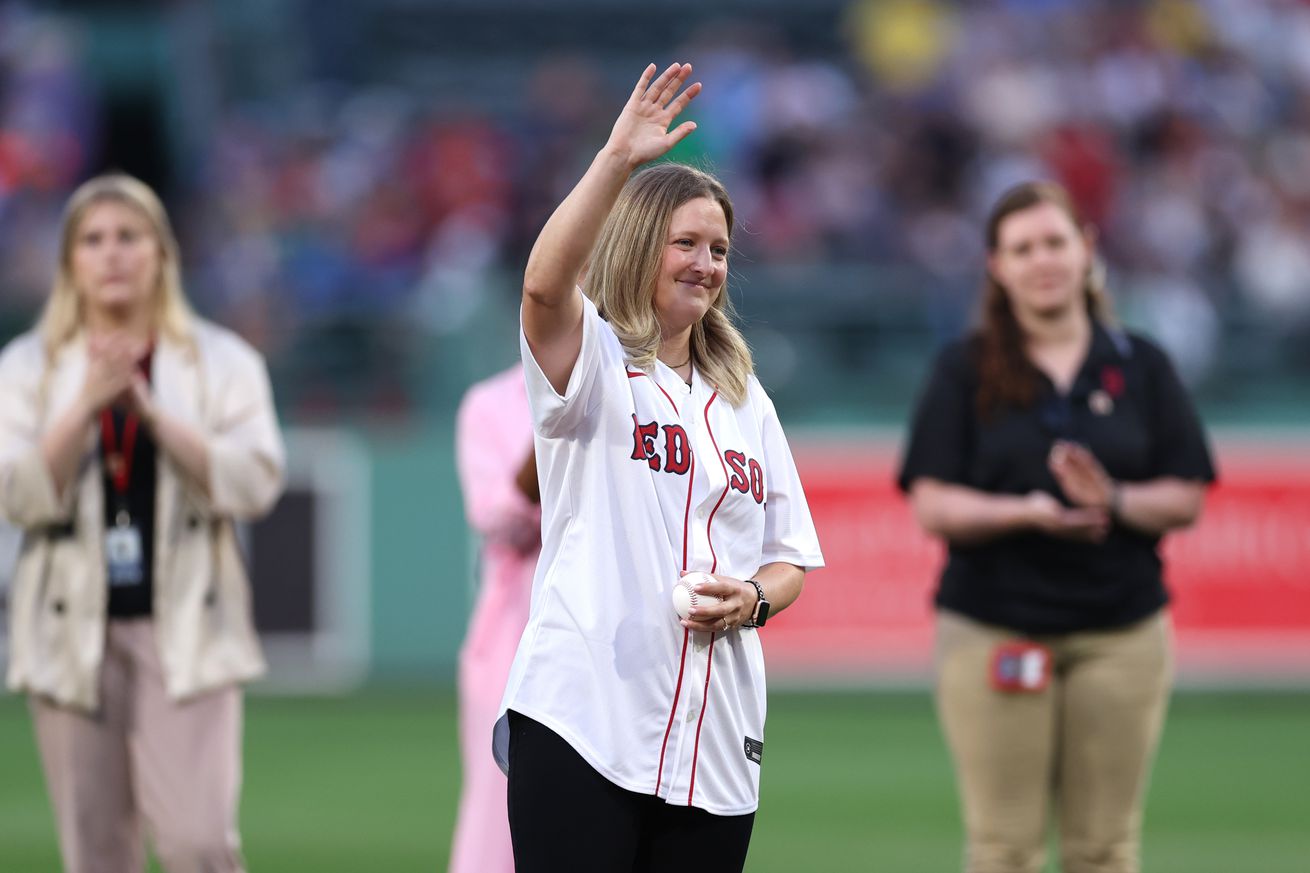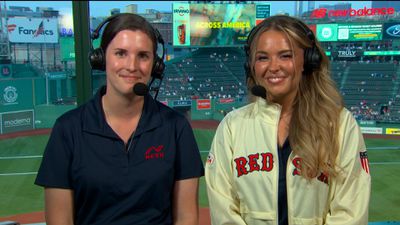
After some major whiffs, and a couple of stunts, plenty of female fans did not feel seen by NESN’s lip-service program.
I have written on this site before that MLB isn’t doing enough to authentically engage fans who are women. Offering light pink hats for sale is a fashion choice, not engagement, but most of the time that’s the extent of the league’s efforts.
Well, they had another opportunity this week: Women’s Equality Day, which the Red Sox celebrated by inviting two female broadcasters into the NESN broadcast booth. The broadcasters were Emma Tiedemann and Rylee Pay, who’ve called Portland Sea Dogs games since the start of the 2023 season. I’ve been a fan of their brand of egoless, knowledgeable game calling ever since, so I knew they’d hit it out of the park. But regardless of their talents, there were worrying signs from the start:
“Unfortunately and inexplicably though, NESN is jamming them in there alongside Dave O’Brien and Kevin Youkilis, rather than letting them call the game on their own. This decision makes the game feel like a stunt more than anything, and a four-person booth seems like a disaster waiting to happen. Next time, just let Tiedemann and Pay do their jobs.” — Dan Secatore, Over the Monster
I was relieved that a man wrote that, so I didn’t have to. (Another male writer wrote something similar on our Slack channel, noting the women’s depth of experience within the Sox organization.) Not only is this crowding the booth, but the Sox are missing a huge opportunity to connect with women.
Maybe the men in charge are looking at this a different way, but I assure you, women see this and think: They don’t trust us to handle the job on our own.
To put this in context, the point of the special broadcast was to celebrate Women’s Equality Day, which was passed by Congress in 1973 and commemorates the day in 1920 when women were granted the right to vote. The Sox and NESN missed an opportunity to underscore and amplify the idea of equality.
In the pregame show, Tom Caron repeatedly mentioned this historic broadcast as a source of “inspiration” for young girls watching from home, who would see Tiedemann and Pay and say “Hey, I can do that.” His intentions were pure but this is a bit hollow…because just as surely as these girls can see the women on air, they can also see that they weren’t allowed to do it on their own, as the men do every day.
It was announced that Tiedemann and Pay would exclusively provide the play-by play for innings four through six, not simply share the booth. A more generous approach, certainly, would be to let the first-timers have their moment in the sun, just cede the space and airwaves to them for one special broadcast. Then back to business as usual the next day. (By the way, we’ve been writing an article about the regular NESN broadcast booth—stay tuned for that.)
In fact, Dave O’Brien and Kevin Youkilis indicated that they’d leave the booth during the middle innings so Tiedemann and Pay could have it to themselves—but they didn’t! Nor did they let them handle the middle innings on their own, as promised. They continued to chime in with their thoughts, though Tiedemann did do the play-by-play.
I described the scenario to another female sports fan in Seattle and she said:
“So condescending and paternalistic.” – A female sports fan in Seattle
In MLB lingo, we might call this brief broadcast “a cup of coffee” for the women—but all things considered, it was more like a sip from a to-go cup. I can’t call it a wasted opportunity, because Tiedemann and Pay were a breath of fresh air for NESN, but it was something of a whiffed opportunity, unfortunately.
But I’m getting a little ahead here. Back to the pre-game show. It featured an interview with Jean Fruth, a sports photographer and founder of Grassroots Baseball, an organization that is invested in “giving women the same opportunities that men have in sports,” according to Fruth. Her nonprofit also works on behalf of young people and people of color, and its work is supported by Cal Ripken, Jr. and Ichiro Suzuki in Japan.
She’s created a documentary to air during the World Series called See Her Be Her, about professional female baseball players. Not softball—baseball.
“It’s about expanding the game; it’s not at the expense of anybody.” — Jean Fruth
Now there’s equality! I’m here for it.
My initial misgivings aside, I thought this was a fantastic beginning to the celebration. My enthusiasm faded, though, when other interviews and clips portrayed women in a supporting—not equal—role relative to men. That’s the narrative that Rob Refsnyder shared, for example. The premise was that he wouldn’t be where he is today without his mom’s many sacrifices on his behalf—for example, making her minivan his own “personal taxi.” He was totally sincere, and I’m sure he’s a sweetheart son, but this is missing the point of Women’s Equality Day.
The women listening to the broadcast also heard Youk calling the athletes in the Professional Women’s Hockey League (PWHL) “girls.” There may have been little girls listening, but the people he was speaking of are mature women! Men may not hear that, but I tell you, the women in the audience did.
So how did Tiedemann and Pay do? As for the opportunity to be in the MLB booth, they thanked everyone profusely. Particularly in the early innings, though Dave O’Brien did lob them some questions, they spoke only when directly addressed. Maybe that’s appropriately humble for two rookies. But contrast their silence with Youk running at the mouth, talking about mixing pizza and coffee together (huh?) and calling himself a “fat kid.” I wish he could have allowed them more time to speak, particularly given the occasion, and the utter vapidness of his own observations.

As for their actual on-air time? Tiedemann and Pay nailed it.
They knew just what to do, and when. They provided charming, insightful anecdotes—such as personally pulling the tarp in AA, or discussing Cape Cod League rivalries. I learned a lot from them: insight about AA umpiring crews, the specific challenges of moving from AA to AAA, facts about former Sea Dogs such as Wilyer Abreu’s approach to playing the Green Monster replica in left field and how that might inform his work in Fenway’s right field. Funniest of all, Tiedemann shared that Marcelo Mayer and Roman Anthony have offered their babysitting services for her six-month old daughter! Great insight there into two of the Big Three (or Four).
But these anecdotes didn’t interfere with the flow of the game, which was refreshing! And Tiedemann calls a great game: descriptive, detailed, precise.
When given the chance, Tiedemann and Pay made their broadcast partners better, even smoothing over at least one misstep. When Youk butchered Blue Jays’ center fielder Joey Loperfido’s name (and oddly sounded kind of proud of it), Tiedemann deftly gave him a leg up for the future by supplying him with the correct pronunciation of an up-and-coming AA player. What a gift to the broadcast—she drew the focus away from Youk’s mistake and taught us all something too. And it was done in a way that you could tell made Youk feel good about it—he had something in his back pocket for later that he’s going to pull out when the time is right. Was that Tiedemann’s effortless grace and inherent love of teaching what she knows about the game…or is it just something women do because we’re conditioned to do it? (By the way, Jhostynxon Garcia’s name is pronounced Just-INX-son. She threw in his brother Johanfran—Yo-HAN-frahn—as a bonus.)
Somewhere in the middle of the game, I received an email from NESN. It contained a press release about the very event that we were all watching, which said in part:
“[Tiedemann and Pay’s] participation is part of NESN’s broader efforts to amplify female voices in sports broadcasting and celebrate women’s contributions across the industry.” —NESN press release, August 26, 2024
All well and good. The press release also announced the creation of the Emerging Talent Rotational Program, a one-year program for undergrads or recent college grads who are interested in working on-air in the world of sports broadcasting. The press release went on to describe what was in store for “highly collaborative, adaptable individuals of all genders” [emphasis mine] and informed them how to apply.
Pardon? Do they mean something like “people who identify as female”? Or did they just use the fanfare of a special broadcast to advertise something that’s open to everybody, under the guise of “amplify[ing] female voices in sports broadcasting and celebrat[ing] women’s contributions across the industry”?
I think they did! And that’s crass.
Cosmina Schulman of Women of NESN (WON), an internal group of female NESN employees, met with Tom Caron during the pregame show and described the program too, but left the definite impression that this was a program for women—though it must be noted that she didn’t use those words. It was simply the impression that she left. It was the later press release that clarified that the opportunity was also open to men.
I reached out to NESN’s public relations department (the senders of the press release) for clarification, and a NESN spokesperson provided the following quote.
“It’s no secret that women traditionally have been underserved in the sports broadcasting industry. Women of NESN is supporting this initiative in order to provide a pathway for all emerging talent, particularly those who may not have had an opportunity otherwise. For this reason, we encourage applications from all individuals, regardless of how they identify their gender.” —NESN spokesperson
I wish that this article could have been solely devoted to amplifying and celebrating women’s contributions to sports and sports broadcasting, as NESN said the evening was meant for. But NESN made that impossible, simply because of how they set it up. And the cynicism of announcing their new program in this way—again, under the guise of providing opportunities for women—was like a sour cherry on top. Since this program isn’t designed for women, I don’t see how it belongs here. Please find your public relations splash somewhere else for your regular ol’ program.
So my overall impression is that individual women such as Fruth, Tiedemann, and Pay excel at what they do, and are truly embodying equality. If only NESN had simply let them shine on this day.
Can you see why I’m left with the strong impression that the Red Sox and NESN, who are not really hearing their own mixed messaging, probably feel quite satisfied about the broadcast? How they feel they’ve done enough to engage with female fans (or to welcome potential new ones) until next year on August 26? Even though part of that engagement—the emerging talent program announcement—was a stunt that took advantage of the occasion?
It’s unsatisfying and patronizing to female fans, and not much different from a regular day of MLB baseball. It seems pretty clear that the main form of engagement will continue to be trying to sell me a light pink hat.